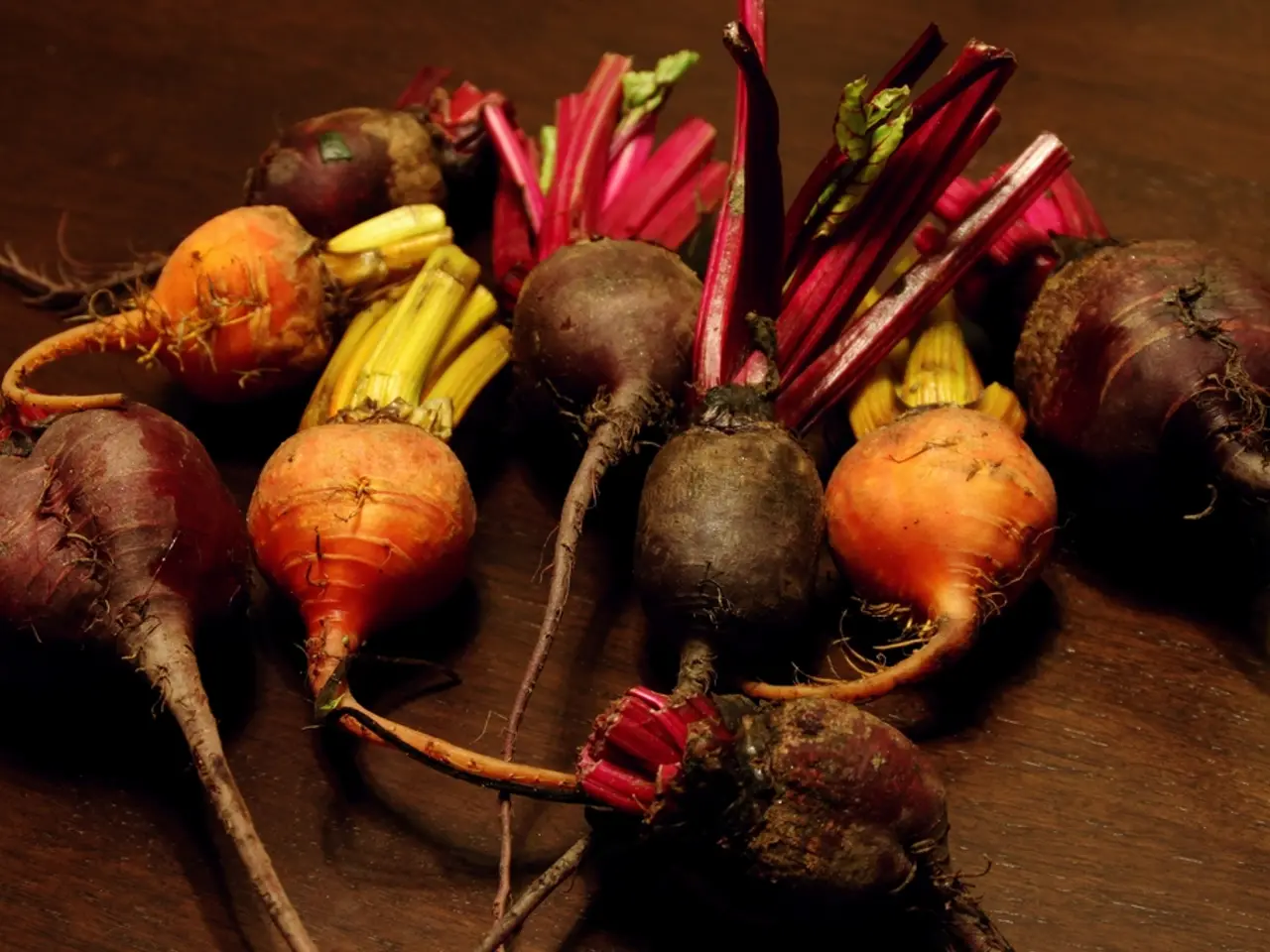Benefits and Applications of Beetroot Powder, Potential Risks, and Additional Facts
=========================================================================
Beetroot powder, derived from the humble beetroot, has gained attention for its potential health benefits and biological activity. This versatile supplement comes in various forms, including powder that can be added to food or drinks, and beetroot juice.
One of the key components of beetroot powder is betalain, a plant nutrient known for its ability to reduce oxidative and nitrative stress. This property can protect against cell and DNA damage, potentially lowering the risk of chronic diseases such as obesity, autoimmune disorders, and diabetes.
Beetroot powder is particularly beneficial for individuals with high blood pressure, as it may help lower blood pressure levels. However, people with low blood pressure should consult a doctor before using beetroot powder to avoid excessive blood pressure lowering.
The nutritional profile of beetroot includes protein, carbohydrates, fat, amino acids, and fatty acids. Additionally, it contains phytonutrients like betalains, polyphenols, flavonoids, vitamins, and nitrate, which may play a role in reducing the risk of chronic diseases.
When it comes to athletic performance, beetroot powder may offer some unique advantages. Its nitrates convert to nitric oxide in the body, which can improve blood flow to muscles, enhancing oxygen transport and possibly increasing endurance and performance, particularly for those less trained or during more demanding exercise sessions.
The recommended dosage of beetroot powder for health and athletic performance typically ranges around 5 to 8 grams per day. This amount, equivalent to the nitrate content found in about 250 mL of beet juice, has shown benefits such as lowering blood pressure and improving exercise endurance.
However, it's important to note that consuming large amounts of beetroot powder can increase the risk of side effects. These may include red or black colored stools and pink or red urine, dizziness, rash, swelling, coughing, difficulty breathing, nausea, and vomiting. These symptoms may indicate an allergy, so it's advisable to consult a healthcare provider before starting supplementation, especially if taking blood pressure medications.
Beetroot powder can be mixed into water, smoothies, or juice. Taking it about 2-3 hours before exercise may provide the best performance enhancement effects. Storing beetroot powder properly (cool, dry place) is important to preserve its nitrate content.
In summary, 5 to 8 grams daily of beetroot powder is recommended for overall health and athletic performance benefits primarily due to its nitrate content, with minimal side effects mainly involving harmless urine/stool color changes and rare digestive upset.
For athletes, beetroot juice intended for athletic performance may require 140 milliliters per day. As research continues, more information will likely emerge about the benefits of beetroot powder on chronic diseases, athletic performance, and overall health.
- In the realm of health-and-wellness, beetroot powder, a supplement sourced from the beetroot, has gained recognition for its possible health benefits and biological activity.
- With betalain, a plant nutrient, as one of its key components, beetroot powder shows promise in reducing oxidative and nitrative stress, potentially lowering the risk of obesity and diabetes.
- Apart from its potential health advantages, beetroot powder can benefit individuals with high blood pressure by helping regulate blood pressure levels.
- The versatility of beetroot powder allows it to be added to food or drinks as a supplement, or consumed as beetroot juice.
- Besides betalain, beetroot is rich in phytonutrients such as polyphenols, flavonoids, vitamins, and nitrate, which may play a role in predictive health by reducing the risk of chronic diseases.
- In the field of fitness-and-exercise, beetroot powder may offer unique advantages due to its nitrate content, which can potentially enhance oxygen transport and increase endurance during more demanding exercise sessions.
- For individuals interested in healthy-cooking, beetroot powder can be easily incorporated into various food-and-drink recipes, particularly smoothies and juices.
- Proper storage of beetroot powder in a cool, dry place is essential to preserve its nitrate content and maximize its benefits for health and athletic performance.




